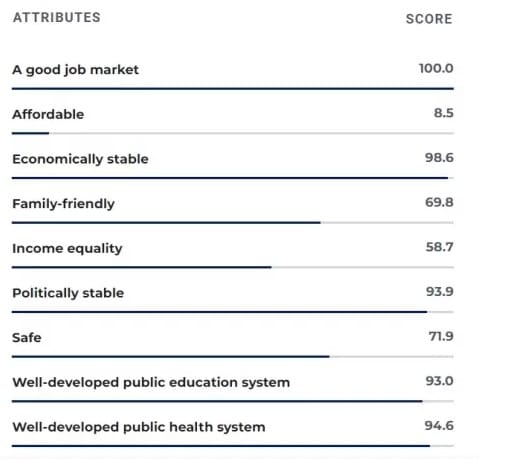Germany is without a doubt one of the world’s most powerful economic powers, ranking seventh overall in the list.
The country boasts a strong economy, as well as well-developed public education and health systems. Other advantages include a trained and diverse workforce, as well as booming telecommunications, health, and tourist sectors.
Germany is also a global leader in imports and exports, as well as the birthplace of numerous historical cultural icons (govisafree.com)
In this article, let’s explore a number of reasons why working in Germany is a good idea.
I. QUALITY OF LIFE (https://govisafree.com/best-countries-to-live-in/)


II. HIGH SALARY FOR NURSES
Before Recognition – A minimum salary of 2.400 EUR that could go up to 2.800 EUR.
After Recognition – A minimum salary of 2.800 EUR that could go up to 3.800 EUR and even more.
III. ELIGIBILITY FOR GERMAN CITIZENSHIP
After working for 5 years as Nurse in Germany, you are qualified to become a Citizen.
- German passport is ranked third as the most powerful passport in the world.
- You can be a German citizen after a certain amount of time depending on the responsible foreign authorities in your city.
- You have the right to own a property in Germany before becoming a German citizen.
- Having a German resident permit allows you to travel all over Europe.
IV. FAMILY REUNION VISA
- You can request for your spouse and children to reunite with you once you are a fully recognized nurse in Germany which usually happens 6 to 9 months from start date of employment in Germany
- GROW will shoulder the Family Reunion Visa fees of your immediate family members for your reunification.
V. CHILD BENEFITS
- The main child benefit in Germany is called Kindergeld. Every child is entitled to have this monetary allowance and is paid to one of the parents on a monthly basis until the child reaches the age of 18.
- Preschool, Elementary and Secondary Full-time schooling is free in Germany. You do not need to think about their tuition fees since the German government got you covered.
VI. PAID LEAVES
Maternity – Parental Leaves
- You are entitled for a paid Maternity leave six weeks before your due date until eight weeks post-delivery. You will receive a full salary from your employer.
- Both mothers and fathers are able to take the Parental leave of up to THREE YEARS. Parents are entitled to parental work benefit from the state that usually account to 67% of your normal salary. Employee ́s rights in Germany such as Parental Leave are protected by law.
Annual Leave
- Germany ranks among the top 5 countries worldwide (Austria, France, Spain, South Korea and Germany) for the most paid vacation days per year. During your paid time-off, you continue to receive your regular salary.
- The minimum statutory vacation days an employee is entitled to in Germany are 20 days per year for a regular 5-day work week. Respectively 24 days of paid holiday for a 6-day work week. Your entitlement for paid vacation is called “Urlaubsanspruch”.
- Most employers grant up to 30 days.
Sick Leave
- If you are on sick leave for less than six weeks, you will, in principle, continue to receive your salary.
- If you are on sick leave for more than six weeks and your employer no longer pays you as a salary, you will receive a sick pay “Krankengeld” from your health insurer instead of your salary. The amount of sick pay you will receive is about 60% of your wage.
VII. COMPULSORY INSURANCES
Health Insurance
- You will be automatically covered by state health insurance (Gesetzliche Krankenversicherung – GKV) if you work in Germany and earn between € 4,950 and €59,400 a year before tax.
- GKV also usually includes nursing care insurance (pflegepflichtversicherung). Employers cover half of the health insurance costs (excluding the supplementary charge) with a maximum contribution of €323.03 a month for health care and €56.42 a month for nursing care (www.expatica.com).
Assistant Insurance
- If you move to Germany as an employee, you will automatically be covered by gesetzliche Unfallversicherung, which protects you in the event that you suffer a bodily injury or illness in the course of work or on your commute to work.
- The good news is that this form of insurance is free to employees, as employers bear liability and pay the premium for it. However, employees have a duty to help prevent workplace accidents (ottonova.de).
Long – term Care Insurance
- Long-term care benefits are funded by mandatory contributions from all employees in Germany (currently 3,05% – 3,4% of annual salary). The scheme is either provided by your statutory health insurance or your private health insurance. The type of long-term care support you receive depends on your situation and the type of insurance you have.
Pension Insurance
- Germany’s pension system consistently ranks highly among pension systems worldwide. This ranking is also steadily improving as Germany‘s government works to reform and streamline its pension system.
- The statutory pension insurance benefit (RV) is paid out to individuals from retirement age and provides basic payments of around 70 percent of your working net income. There is also a safety net for low-income pensioners.
Unemployment Insurance
- The amount of benefit you receive is based on your average net pay in the 12 months before you became unemployed (known as the “assessment period”). Your benefit will be 60% of your previous average wage (or 67% if you have children), up to a maximum of 7.050 euros per month in West Germany and 6.750 euros in East Germany (www.iamexpat.de).
VIII. LABOR AND EMPLOYMENT LAWS IN GERMANY
General Act on Equal Treatment (“Allgemeine Gleichbehanlungsgesetz” or AGG)
- Employers have to ensure that discrimination does not take place. In addition, they are obliged to take measures against employees who discriminate against other colleagues. The possible measures for this purpose range from a transfer to another post over a reprimand up to a dismissal.
Remuneration Transparency Act (“Entgelttransparenzgesetz”)
- The core content of the Remuneration Transparency Act is the prohibition of direct and indirect salary discrimination on grounds of gender. According to the law, direct pay discrimination exists if an employee of either sex receives a lower pay than an employee of the other sex for the same or equivalent work.
Continued Remuneration Act (“Entgeltfortzahlungsgesetz”)
- Entgeltfortzahlungsgesetz, EFZG (Continued Remuneration Act) If an employee falls ill or gets injured at work, then they are protected through provisions under the Continued Remuneration Act (Entgeltfortzahlungsgesetz). This act also regulates the payment of wages on public holidays as well.
Act against Unfair Dismissal (“Kundigungsschutzgesetz”)
- Both the employer and the employee may end an employment relationship by giving notice of termination. As the employment generally is an employee‘s sole and most important source of income to sustain his/her livelihood, the law protects employees by requiring that employers, who wish to terminate an employment contract, provide a good reason for the termination.
These are just some of the reasons why working as a Nurse in Germany is a good idea. For more details regarding working in Germany, please get in touch with us at [email protected]

0 Comments